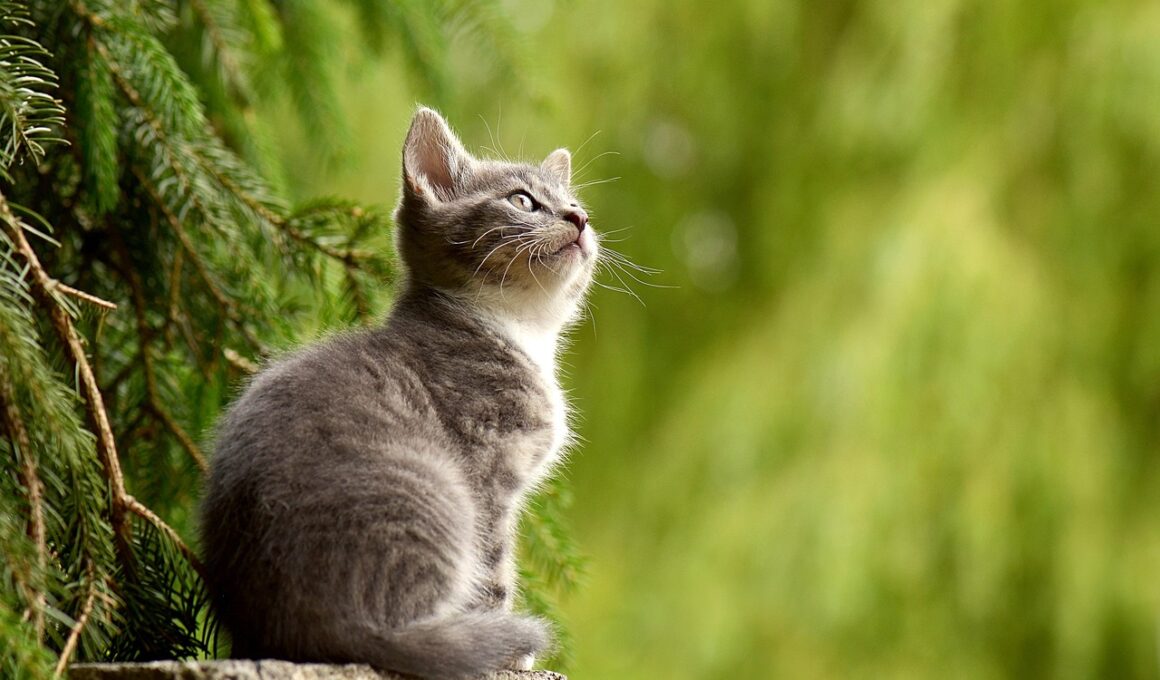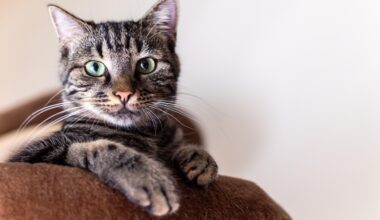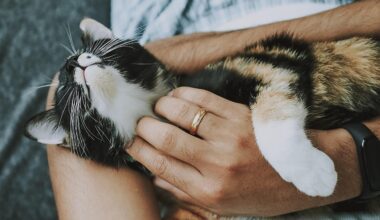Essential Vitamin Guidelines During Kitten Weaning
Weaning is a critical phase in a kitten’s development, marking the transition from mother’s milk to solid food. Proper nutrition during this stage ensures that kittens flourish and grow. One of the essential elements in a kitten’s diet includes vitamins which play a significant role in overall health. Vitamins such as A, D, E, and K are crucial not only for growth but also for bolstering the immune system. The correct balance of vitamins supports healthy bones, eyes, skin, and reproductive organs. Kittens typically become less dependent on their mother’s milk by about eight weeks, requiring a diligent transition to solid food. Pet owners should consider high-quality kitten food that’s specifically formulated to provide balanced nutrients. Consulting a veterinarian during this period can help ensure that kittens receive all necessary vitamins and minerals. Additionally, monitoring the kitten’s weight and health during weaning is vital. If any concerns arise, adjustments can be made quickly. Lastly, always ensure fresh water is available at all times to adequately support nutritional absorption and hydration.
Introducing solid food is not just about providing food but also about embedding healthy eating habits. This means pet owners should slowly mix wet food with dry food to create a palatable dish for the kitten. Wet food can enhance the appeal and makes the transition smoother, as it is closer in texture to maternal milk. Over a week or two, the amount of dry food gradually should increase while reducing the wet food. In doing so, owners can observe how the kitten reacts to the new food. Some might experience digestive upset or reluctance to eat; these signs warrant immediate consultation with a vet. The integration of a high-protein dry food designed for kittens is important due to their higher energy needs compared to adult cats. Furthermore, certain vitamins need to be supplemented if the chosen food lacks specific nutrients like calcium and phosphorus. Owners should also look for food enriched with omega fatty acids that support skin and coat health, as kittens often have delicate skin at this stage.
Important Vitamins for Growing Kittens
Several vitamins are particularly important for kittens as they transition through weaning. Vitamin A is critical for vision and immune function, helping kittens fight off infections as they grow. This vitamin can be found in high amounts in liver and fish, which many cats enjoy. Vitamin D supports calcium absorption, essential for the development of strong bones and teeth. Cats often receive Vitamin D through exposure to sunlight, but it’s also present in high-quality cat foods. Vitamin E acts as a powerful antioxidant, essential for healthy cell functions and reducing oxidative stress. Moreover, B vitamins contribute significantly to energy production and neurological function; these vitamins should not be neglected. Foods that provide a balance of these vitamins should be prioritized during feeding. Be attentive to the sources of vitamins in the food you select, keeping an eye on the nutritional labels. Relying on commercial kitten chow can be beneficial, but ensuring a good mix of protein and vitamins is crucial for healthy growth. The balance of ingredients can make a significant difference.
A well-balanced diet should also feature essential minerals which pair with vitamins to ensure optimal growth. Calcium and phosphorus are two imperative minerals extensively required for skeletal development. Kittens require a diet that provides a ratio of calcium to phosphorus, typically around 1.2:1 to support bone health. Foods specifically formulated for kittens usually contain these minerals in adequate amounts. However, be cautious with homemade diets — they may lack the essential balance unless overseen by a veterinarian or pet nutritionist. In addition to calcium and phosphorus, trace minerals like zinc, iron, and selenium are invaluable in the kitten’s diet. Zinc supports immune health and skin quality, while iron is critical for oxygen transport in the bloodstream. Selenium is important for reproductive and thyroid function. Owners may consider supplements if their kitten does not get enough of these minerals from food. Consultation with a vet is always a wise step to take, helping direct owners to feeding protocols ensuring optimal nutrition through this sensitive growing phase.
Recognizing Nutritional Deficiencies
Understanding signs of nutritional deficiency in kittens is vital for proactive health management. Kittens lacking essential vitamins may exhibit lethargy, poor coat condition, and stunted growth. For instance, if a kitten is not receiving enough vitamin A, it may present with eye issues, making it critical to observe these signs closely. A dull coat often indicates insufficient omega fatty acids or other nutritional deficiencies; hence, monitoring coat condition is equally important. Changes in behavior, such as reluctance to play, can also indicate nutritional imbalances. Frequent vet check-ups during weaning are beneficial because professionals can assess health and make dietary recommendations. Additionally, owners can keep a food diary to track what their kittens eat, noting any odd behaviors related to their diet. If noticing concerning signs, quick interventions with dietary changes or supplementation can prevent long-term health problems. Keeping an eye on kitten growth and checking weight monthly is essential, reflecting a well-established link between proper nutrition and growth rates in young cats. Thus, an attentive and informed approach is crucial during this period.
Many owners might contemplate incorporating homemade meals into their kittens’ diets. While this practice may allow for better control over ingredients, it can pose challenges regarding nutrient balance. Ensuring that homemade meals provide all essential nutrients, including vitamins and minerals requires extensive research and proper planning. Some common ingredients that demonstrate high nutrient density include lean meats, eggs, and specific vegetables; however, these should be combined in balanced proportions. Discuss these plans with a veterinarian to ensure meals are suitable for the growing kitten. It is vital to remember that not all human foods are safe for cats, so caution should be exercised. In certain cases, homemade diets might require supplementing specific vitamins. In contrast, commercial diets are designed to meet the dietary requirements of kittens and may be more practical for most owners. In conclusion, while homemade meals can be beneficial, they necessitate considerable attention to improve nutrition quality. Identifying the appropriate mix and portion sizes can be complex without professional advice, so pet owners should proceed carefully.
Conclusion: Ensuring a Healthy Start
In summary, the weaning phase is an essential time for kittens, requiring close attention to their dietary needs. The right balance of vitamins is necessary to support healthy growth and development. Consulting with veterinarians and pet nutritionists can provide invaluable assistance in choosing optimal food and supplements. The introduction of solid food should be done progressively, monitoring for signs of distress or deficiencies. Overall, the nutritional status of a kitten lays the groundwork for long-term health; thus, investing time and effort into ensuring dietary adequacy is beneficial. Observing changes in energy levels, behavior, and appearance offers insight into nutritional health. Additionally, monitoring weight regularly can help assess the kitten’s growth, promptly addressing deficiencies as they arise. Pet owners should familiarize themselves with general vitamin requirements and the consequences of insufficient nutrition. Solid food choices, whether commercial or home-prepared, must be scrutinized to guarantee a well-balanced diet. Ultimately, this crucial developmental stage sets the stage for a vibrant, healthy adult cat, underscoring the importance of a nutrient-rich diet throughout the weaning process.
Eventually, the nutritional choices made during a kitten’s early life underscore their lifelong health. Providing a balanced diet supported by essential vitamins and minerals creates a stronger foundation for adulthood. On laying this groundwork, kittens become equipped to thrive, developing ideal immune systems and physical capabilities that will last through their lives. Choosing high-quality food with a focus on kitten-specific requirements ensures that all stages of their growth are supported, paving the way for excellent health. With proper care and attention during this weaning period, you can contribute significantly to your kitten’s overall well-being and happiness, allowing them to live a full and prosperous life. In essence, this time is defining and shapes how they respond to their environment and maintain their health. The focus on a nutrient-rich diet during weaning helps prevent future health complications. Therefore, every choice made during this phase matters, setting a precedent for their growth trajectory. Fostering strong health habits through nutrition at this young stage is invaluable. Thus, owners should embrace this responsibility, ensuring their kittens get the best possible start.


